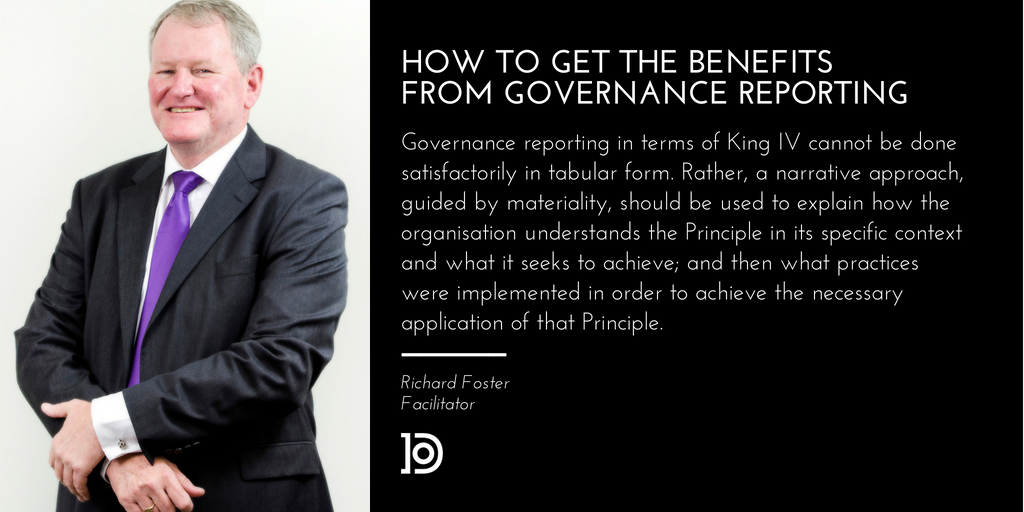 Recent events in both the public and private sectors are again highlighting the key role that proper succession planning plays in supporting any organisation’s sustainability, particularly when it comes to CEOs and governing-body chairs. Poor succession planning inevitably creates a leadership vacuum at both governing body and executive management level resulting in a loss of the longer term strategic focus. The impacts of this uncertainty can be dire, says Richard Foster, facilitator at the Institute of Directors in Southern Africa (IoDSA). Impacts can include a loss of performance delivery influenced by such factors as possible churn at the senior management level, the loss of market share to more focused competitors, severe reputational damage and erosion of investor and other key stakeholder confidence in both the governing body and senior management alike. “Because good governance relies on effective leadership, succession planning receives significant focus in King IV. In addition, its five sector supplements deal with the specific issues relating to succession planning in different contexts,” Mr Foster notes. The position is particularly complex when it comes to state-owned entities (SOEs) because certain appointments like the CEO and governing-body chair are typically mandated in legislation or founding documents. The shareholder thus plays a key role, and the process is not as easily aligned with what is considered governance best practice, he says. A similar situation exists in local government. One mark of the difficulties of proper succession planning at SOEs is the reliance on interim appointments. However, they inevitably create uncertainty unless they are well thought-through and the process is properly communicated to stakeholders. “One of the governing body’s primary functions is to create and oversee the implementation of strategy, implying a three-to-five-year, or even longer timeline. Interim appointments, by contrast, tend to be operationally focused pending a permanent appointment,” he says. King IV recommends that governing bodies should ensure succession plans exist for their own members, as well as for the CEO and executive management team. However, because succession planning is intimately connected with the appointment of these senior office-bearers, succession planning for SOEs is, as previously mentioned, more complex and challenging. Typically, the shareholder/executive authority (ultimately the government) has the power (or obligation) to appoint the chair and/or the CEO and/or other governing-body members. In its SOE Sector Supplement, King IV recommends that these appointments should be accomplished via a robust and transparent process that involves the governing body (the accounting authority) as much as possible to give effect to the aspirations of the relevant principle. “The processes for appointing CEOs or chairs at certain SOEs is sometimes questioned. The damage caused by unsuitable appointments is now plain, and both the organisations and the economy as a whole are affected,” he says. To align succession planning in SOEs better with governance best practice, the King IV SOE Sector Supplement recommends that the CEO’s letter of appointment should clearly state that the CEO is accountable to the governing body (rather than the executive authority i.e. shareholder), that the governing body and CEO jointly agree on how the CEO’s performance should be measured, and that the governing body has the primary responsibility for firing the CEO. “It is encouraging that Government seems to have now recognised that good corporate governance requires ethical and effective leadership, and that increased focus appears to have been placed on the succession planning and attendant appointment process,” Mr Foster concludes. “The consequences of not following the recommended practices of good governance are now plain to see.” ENDS MEDIA CONTACT: Idéle Prinsloo, 082 573 9219, [email protected], www.atthatpoint.co.za For more information on the IoDSA please visit: Website: www.iodsa.co.za Twitter: @The_IoDSA LinkedIn: Institute of Directors in Southern Africa Company Page
0 Comments
The first reports and disclosures in line with King IV principles are beginning to appear. King IV is effective in respect of financial years starting on or after 1 April 2017. It would appear that certain organisations still require a deeper understanding of the implications of King IV’s “apply and explain” approach, says Richard Foster, a governance advisor, professional non-executive director and Institute of Directors in Southern Africa (IoDSA) facilitator.
“King III’s ‘apply or explain’ regime had the unintended consequence of allowing organisations to adopt something of a tick-box approach to reporting and compliance. The new approach signals a decisive departure from that way of doing things because it requires organisations to explain how they have applied the 17 principles of King IV,” he says. “The idea is to give stakeholders a real idea of what the organisation is doing to embody the code and the quality of its governance—and how it is using the code to achieve all of this.” The key here is the requirement to explain. Explanation means that stakeholders can easily ascertain whether the organisation is making satisfactory progress towards good governance. It also, to quote Professor Mervyn King, the convenor of the King Committee in his foreword to King IV, “encourage[s] organisations to see corporate governance not as an act of mindless compliance, but something that will yield results only if it is approached mindfully, with due consideration of the organisation’s circumstances.”Foster suggests the approach should be welcomed because it provides a great deal of flexibility in line with the principle of proportionality. Organisations are now free to adapt how they give effect to the Principles of King IV in line with aspects such as their risk profiles, level of complexity, resources, impact on the triple context and other specific circumstances—provided they explain clearly what their thinking was. “Disclosure under King IV directs us away from a quantitative approach to compliance (‘We have implemented the following recommended practices’ or ‘We have implemented all recommended practices except’) to a qualitative one (‘In order to give effect to this Principle of good governance, we have taken the following actions’),” he explains. “The Principles are generic and can be applied to any organisation, what’s unique is how each organisation crafts that application to achieve the goals or outcomes corporate governance: ethical culture, effective control, good performance and legitimacy.” The challenge that organisations now face is that they have to engage deeply with the spirit of corporate governance, rather than its letter. That engagement, and the actions that flow from it, need to be informed by an ethical framework. In practical terms, governance reporting in terms of King IV cannot be done satisfactorily in tabular form. Rather, a narrative approach, guided by materiality, should be used to explain how the organisation understands the Principle in its specific context and what it seeks to achieve; and then what practices were implemented in order to achieve the necessary application of that Principle. King IV allows organisations to deliver their governance reports in various ways as best suits their circumstances: either as a standalone report, or as part of the integrated report or some other report as they consider appropriate for their stakeholders. According to Parmi Natesan, Executive: Centre for Corporate Governance, the IoDSA has recently published its own governance report which can be used as an example of the envisaged approach. A significant amount of time and thinking went into how we wanted to tell our governance story, to enable our stakeholders to make an informed assessment of the quality of the IoDSA’s governance. “Reporting under King IV is all about understanding corporate governance and then explaining how you have implemented it; it’s not about keeping a register of which rules you have followed,” Foster concludes. “It’s highly flexible but it does require organisations truly to engage with what they are doing to improve governance, and what they hope to achieve.” ENDS MEDIA CONTACT: Juanita Vorster, 079 523 8374, [email protected], www.atthatpoint.co.za For more information on the IoDSA please visit: Website: www.iodsa.co.za Twitter: @The_IoDSA LinkedIn: Institute of Directors in Southern Africa Company Page |
Archives
July 2024
Categories
All
|


 RSS Feed
RSS Feed